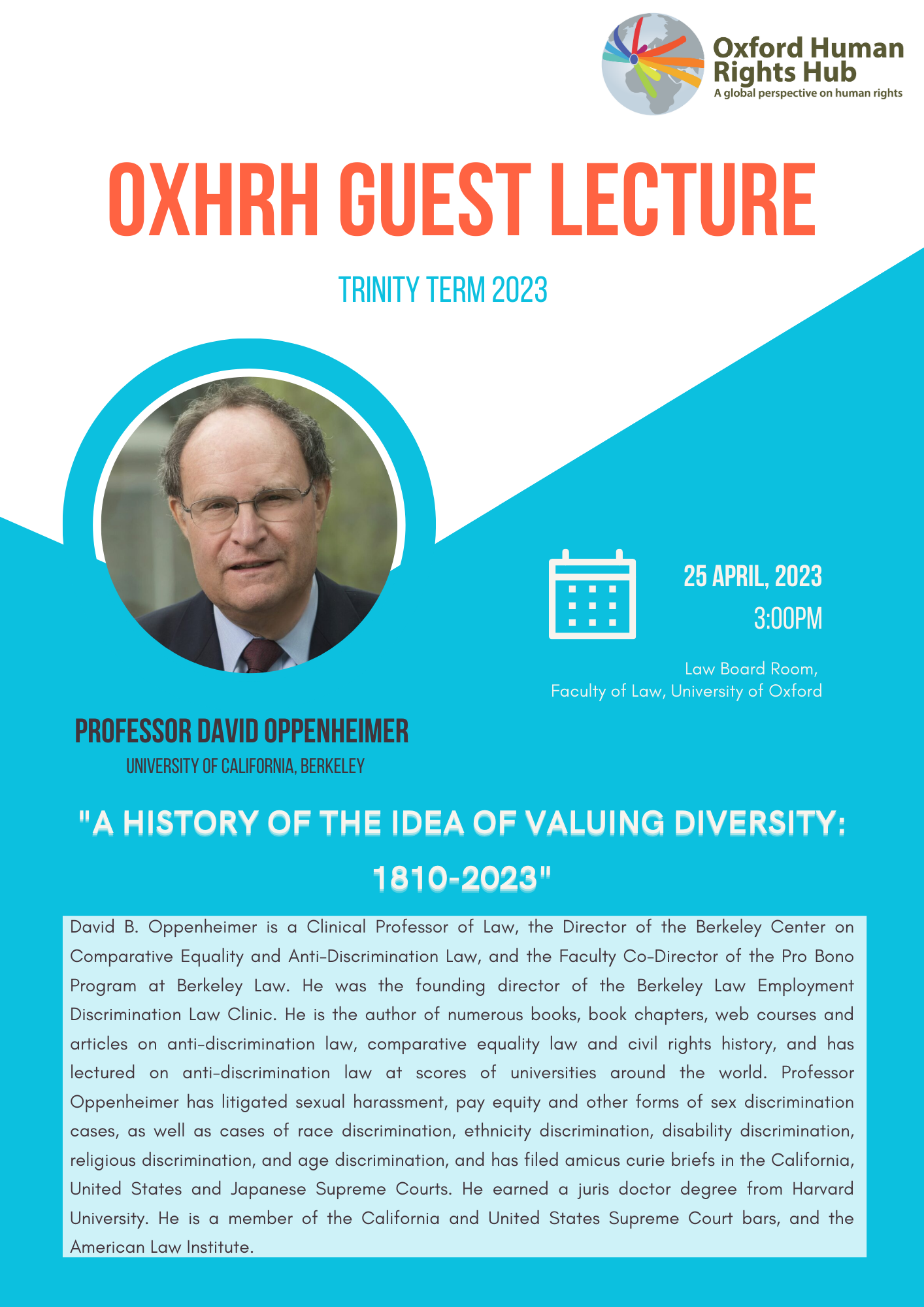OxHRH Guest Lecture: Prof. David Oppenheimer
Prof. David B. Oppenheimer

Oxford Human Rights Hub is delighted to host Professor David Oppenheimer of the University of California, Berkeley for a guest lecture in Trinity Term, to be held in the Law Board Room from 3pm on 25 April.
Register for the talk here: https://forms.office.com/e/s9e5gFAtfW . The talk is open to everyone, but places are limited. So please do sign up for the talk using this form. You can register your interest here by Sunday 23rd April 12.00 PM.
Note: A confirmation email will be sent out to you by 24th April Monday morning. Do note that your registration for the talk is confirmed only if you receive the email. We thank you for your interest and apologise for the limited spaces available.
—
The title of the lecture is ‘A History of the Idea of Valuing Diversity: 1810-2023′. Following is a short blurb.
The idea that diversity has value in learning, civic engagement, commerce, and science, countering the aphorism that “great minds think alike,” is often thought of as a recent phenomenon. My work is intended to demonstrate that the roots of our current understanding of the value of diversity actually run quite deep. The founding of the University of Berlin in 1810 by Wilhelm von Humboldt on a model of experiential learning was closely tied to the decision to admit Catholics and Jews as faculty and students, in order to encourage outsider voices and the resulting clash of ideas. By the mid-nineteenth century a similar process was underway at Oxford and Cambridge, as they opened their doors to nonconformist Protestants as well as Jews and Catholics. The work of John Stuart Mill and Harriet Taylor Mill contributed to the mid-century expansion of the belief that we benefit from a market filled with diverse ideas, and that such diversity requires paying attention to the lived experience of outsiders. Humboldt and the Mills had a profound impact on Charles Elioit, the transformative president of Harvard. When he began his forty year term in 1869 he began admitting Blacks, Catholics, Jews, immigrants, the poor, and eventually women (by founding Radcliffe College), as part of his quest to encourage a clash of ideas. Thus, when we say that American colleges began their affirmative action policies in the sixties, we mean the 1860s. But the US Supreme Court is on the verge of ruling that diversity efforts that consider race or ethnicity violate the U.S. Constitution. Similar rulings about corporate DEI policies may soon follow, as the court takes the side of an increasingly vocal right wing that has declared war on diversity.
Speaker Bio:
David B. Oppenheimer is a Clinical Professor of Law, the Director of the Berkeley Center on Comparative Equality and Anti-Discrimination Law, and the Faculty Co-Director of the Pro Bono Program at Berkeley Law. He was the founding director of the Berkeley Law Employment Discrimination Law Clinic. He is the author of numerous books, book chapters, web courses and articles on anti-discrimination law, comparative equality law and civil rights history, and has lectured on anti-discrimination law at scores of universities around the world. Professor Oppenheimer has litigated sexual harassment, pay equity and other forms of sex discrimination cases, as well as cases of race discrimination, ethnicity discrimination, disability discrimination, religious discrimination, and age discrimination, and has filed amicus curie briefs in the California, United States and Japanese Supreme Courts. He earned a juris doctor degree from Harvard University. He is a member of the California and United States Supreme Court bars, and the American Law Institute.
For more information, please click here: D. Oppenheimer Lecture

